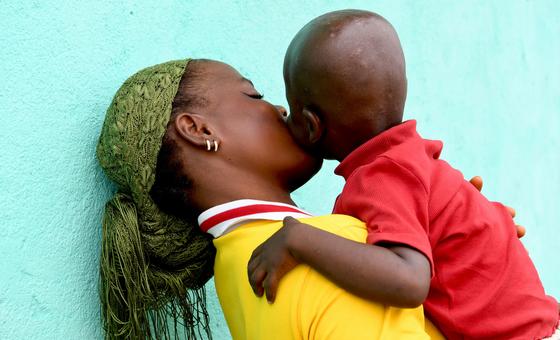Every hour, 11 children die of AIDS, so finding them and offering treatment is as critical as ever, according to the UN entity UNAIDS, which released a new report about how imams, pastors, and priests are reaching those most in need. While three quarters of adults living with HIV are on treatment, only half of children are, the agency reported.
There are still 1.7 million children around the world living with HIV, and they are particularly vulnerable, said Stuart Kean, author of the Compendium of Promising Practices on the Role of African Faith Community Interventions to End Paediatric and Adolescent HIV, co-published by UNAIDS and the US President’s Emergency Plan for AIDS Relief (PEPFAR).
“If they’re born with HIV, then 50 per cent of them will die by the age of two,” he told UN News. “If they don’t and if they are not found and put on treatment, 80 per cent of them will die by the age of five, so there’s much greater urgency to find these hidden children.”
Promising practices
The new compendium documents 41 promising practices that provide evidence of the core roles that faith communities have played. This includes significant strides in identifying undiagnosed children living with HIV, improving continuity of treatment, supporting adolescents to access psychosocial support, care, and treatment, and enabling peer support groups to empower children and adolescents living with HIV.
“This report shows how vital is the role of faith-based organisations in helping children living with HIV to access life-saving treatment, in advocating in support of their needs, and in tackling stigma,” Jacek Tyszko, Senior Programme Advisor at UNAIDS told UN News. “It demonstrates too the approaches that have been most effective, so that they can be scaled up. It’s a report that will help save lives.”
Zambian influencers

Community Influencers, including civic and faith leaders, sensitizing community members of the services being provided in Circle of Hope health posts.
“If you want to find women, go to their places of worship,” said Gibstar Makangila, head of a Zambia-based non-governmental organisation, Circle of Hope.
Since a new community-outreach model unrolled across Zambia’s capital city, Lusaka, in 2018, faith leaders have helped to reach 60,000 people across the country who were not receiving antiretroviral treatment, or ART, he said.
“As a faith community, we are the bridge between the community and health services,” he told UN News. “It is the most influential group in sub-Saharan Africa.”
When social media spread mis- and disinformation about the COVID-19 vaccine, Circle of Hope consulted faith leaders, the “real influencers”, he said. After convincing their congregants of the benefits, vaccination rates in Zambia soared, to 75 per cent from 34 per cent within six months.
Now, these imams, pastors, and priests are now playing a key role in making sure no one is left behind in the global bid to rid the world of HIV/AIDS, according to UNAIDS.
Abstinence and condoms
Contrary to anti-condom or anti-gay myths about religions, faith leaders are driving advocacy efforts to tackle the stigma and discrimination of those living with HIV and advocating for abstinence or at least prevention, including condom use, Mr. Makangila said.
They also readily direct congregants to projects for adolescents and to community health posts, set up as discreet unbranded stalls in markets. Now, 130 community health posts across the country, offer, with Ministry of Health and PEPFAR support, free services, from condoms to on-site treatment. Targeted programmes are also reaching teenagers, he said.
“I’ve seen this result thousands of times in people who would be dead without treatment,” Mr. Makangila said, adding that “the best is yet to come”, with health posts being planned for Côte d’Ivoire, Kenya, Nigeria, South Sudan, and Zimbabwe.

Health providers, local civic and faith leaders, and health workers meet in a one-room Circle of Hope community post in Zambia.
Baby baskets in Nigeria
A new baby is a celebration, commonly in marked in Nigeria in places of worship, where a pregnant congregant typically receives a baby shower basket chock full of goodies, from blankets to diapers.
Now, these welcome baskets include information on HIV testing and support services from local health-care providers, Mr. Kean explained.
Building on a successful trial, the Catholic Caritas Foundation implemented this “congregational approach” in Benue state demonstrating the effectiveness of using on-site confidential testing in such congregational settings as churches.

SDG 3
Across Nigeria, this approach has already reached thousands. From April 2018 to March 2019 alone, 22,197 children under age 15 were referred for HIV testing, 21,142 of them were tested, and 106 new HIV-positive children were identified and linked to treatment.
Eswatini: Community action
The faith-based organisation Shiselweni Home Based Care in Eswatini launched an intervention involving community members visiting people who may be living with HIV, referring them to testing facilities and, if testing positive, supporting them to start and adhere to ART medication.
The latest trend indicates a dramatic 71.4 per cent decline in overall client mortality, from approximately one in three clients in 2007 and one in 10 in 2011.
Religious leaders and faith-based organisations like Circle of Hope in Zambia have also enrolled as “Faith Paediatric Champions”, who advocate to governments and community members for all children and adolescents to be supported to access HIV care and treatment.
Race to end AIDS
However, the global response to end AIDS in children continues to be inadequate, UNAIDS Executive Director Winnie Byanyima and John Nkengasong, US Global AIDS Coordinator and Special Representative for Global Health Diplomacy, said in the new report.
“The work of faith communities in addressing the challenge of HIV in children has been highly effective,” they wrote. “In that work of practical delivery, faith communities, and faith-based organisations have also reminded the world of a deeper lesson: to truly embrace those who are most vulnerable and excluded, caring, compassion, and love are essential.”

